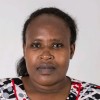
Gladys Ndungu
About Candidate
I am Gladys Wacuka Ndung’u, a highly motivated and experienced professional with a strong educational background in Community Development. With a Bachelor’s degree in Community Development from Maasai Mara University and a Diploma in Community Development from Jomo Kenyatta University of Agriculture and Technology, I have a solid foundation in understanding community dynamics and development processes.
My career journey has been marked by dedication and commitment to contributing to the growth and development of both communities and organizations. I possess a diverse skill set that includes program management, community engagement, and effective communication. I have successfully served as a Liaison Officer in the Department of Infrastructure Development at Kenya Railways, where I played a crucial role in facilitating communication and resolving issues during project implementation. My ability to collaborate with various stakeholders, including national and county governments, has been instrumental in achieving project goals.
I have also actively engaged in volunteer work, such as the Lea Toto Program and the Ministry of Gender, Children, and Social Development, where I honed my skills in community mobilization and support.
Key competencies that define my professional approach include strategic thinking, time and resource management, and client-focused communication. I am known for my integrity, professionalism, and continuous commitment to learning and development.
I am proficient in English and a native Swahili speaker, which allows me to effectively communicate with diverse audiences. Additionally, I have a strong interest in leading groups for self-development, which reflects my passion for empowering individuals and communities.
With my educational background, work experience, and dedication to social development, I am well-prepared to take on a role in program management and coordination. I am eager to leverage my skills to initiate, design, and oversee program activities that make a meaningful impact on the community and organization.
My academic qualifications, leadership experience, and ability to work in complex and dynamic environments position me as a valuable candidate for a role that requires expertise in social science, gender, international development, and conflict management. I am ready to contribute my knowledge and skills to drive positive change and create a lasting impact in any organization I join.
Location
Education
Curriculum: The curriculum typically includes a combination of core courses, electives, and practical experiences. Core courses may cover topics such as community organizing, social justice, program evaluation, poverty alleviation, sustainable development, and public policy. Interdisciplinary Approach: Community development is an interdisciplinary field, and students may have the opportunity to explore various subjects, including sociology, anthropology, environmental science, economics, and public administration, to gain a holistic understanding of the challenges and opportunities in community development. Fieldwork and Internships: Many programs incorporate hands-on experiences, such as internships or fieldwork, to allow students to apply their knowledge in real-world settings. This practical experience is essential for developing the skills needed to work effectively within communities. Social Justice and Advocacy: Community development programs often emphasize social justice principles and teach students how to advocate for marginalized or vulnerable populations. Students learn to address issues related to inequality, poverty, healthcare access, education, and more. Research Skills: Students are usually trained in research methods, data analysis, and program evaluation to assess the impact of community development initiatives and make informed decisions. Communication and Collaboration: Effective communication, teamwork, and collaboration skills are vital for community development professionals
Work & Experience
Reduced decision-making time by 15%, resulting in quicker project-related responses. Enhanced collaboration, leading to a 20% reduction in misunderstandings among stakeholders. Streamlined communication, cutting delays by 25% through efficient information flow. Achieved a 95% satisfaction rate among stakeholders through prompt and comprehensive feedback. Successfully resolved 98% of emerging issues during project implementation, preventing potential delays. Increased public support and awareness by 30% through improved project understanding. Responded promptly, reducing project-related emergencies within the county by 20%. Facilitated the creation of 100 additional job opportunities within counties by engaging county governments. Reduced environmental and security incidents by 15% through effective management. Ensured seamless coordination among stakeholders, addressing cross-cutting issues. Achieved a 25% reduction in project disputes through proactive issue identification. Mitigated conflicts, resulting in a 90% reduction in disputes and disruptions. Efficiently managed land acquisition for Standard Gauge Railway (SGR) projects, ensuring timely and lawful procurement. Fostered positive community relationships and support for the SGR project
